Tops Pellets for Small Hookbills: A Comprehensive Guide
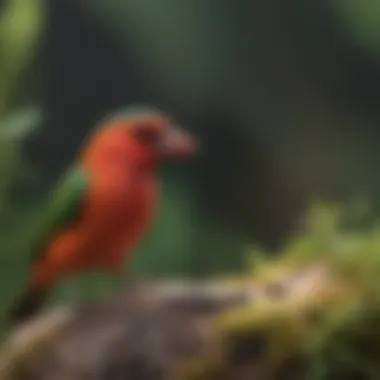
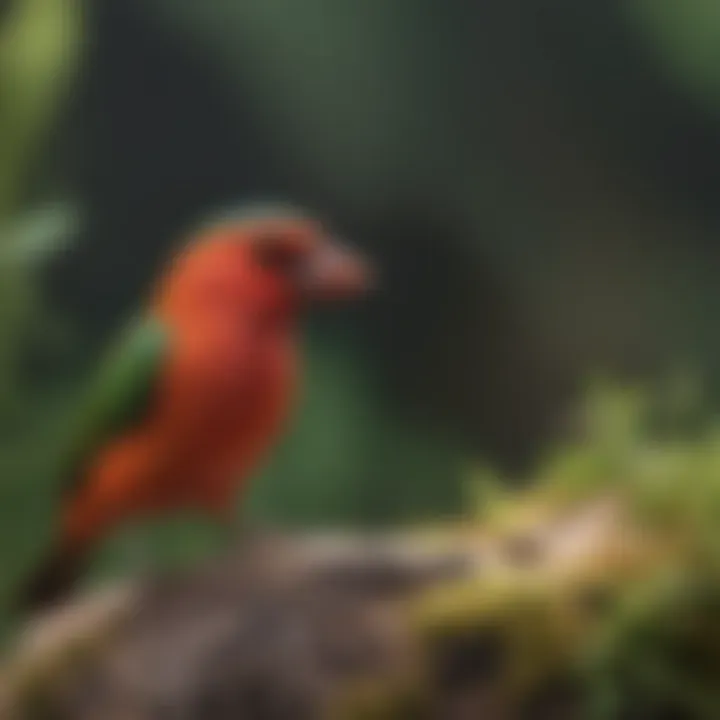
Intro
Understanding the unique dietary requirements of small hookbills is crucial for their overall health. These birds, which include species like budgerigars and lovebirds, have specific nutritional needs best met by high-quality pellets. The right formulation can support their well-being and prevent health issues. This guide will explore various aspects of pellet diets, including essential nutrients, recommended ingredients, feeding strategies, and product suggestions, providing a valuable resource for pet owners.
Nutritional Needs of Small Hookbills
Small hookbills require a balanced diet that incorporates various nutrients. Here are the key components:
- Protein: Essential for growth and maintenance. Look for sources like seeds and legumes.
- Vitamins and Minerals: Vital for immune function. Ingredients such as fruits and vegetables can provide these nutrients.
- Fiber: Important for digestive health. Ensure there is a good amount of fiber in the pellets.
Each species may have slight variations in their needs. Consulting a veterinarian can provide personalized recommendations tailored to each bird.
Transitioning to Pellet Diets
Shifting your small hookbill from a seed-based diet to pellets can require diligence. Start by mixing a small amount of pellets with their usual food. Gradually increase the pellet portion over a week or two. It is critical to monitor their intake to ensure they are still eating enough nutrients. Offer different flavors and brands if they appear resistant to change. Remember that patience is key; they may need time to be accustomed to the new texture and taste.
Common Feeding Issues
Caregivers might encounter challenges in getting their birds to accept pellets fully. Here are some frequent problems:
- Reluctance to Eat Pellets: If your hookbill avoids pellets, consider different shapes and flavors.
- Overeating: Watch for signs of obesity. It may stem from a preference for certain foods. Shifting to a stricter feeding routine can help.
- Picky Eaters: If your bird is selective, balance their diet with fresh items to stimulate interest.
Recommendations for Top Pellets
When selecting pellets, prioritize brands that emphasize quality ingredients. Well-regarded options include Harrison's Bird Foods, and Kaytee Exact. Each of these brands offers a range of formulas suitable for small hookbills, catering to their specific dietary needs. It is crucial to review packaging for specific nutritional information and to select the right pellet size for ease of consumption.
Ending
Knowledge of diet plays a transformative role in enhancing the quality of life for small hookbills. This guide aims to equip pet owners with the necessary tools and insights to choose the right pellets, ensure proper feeding practices, and successfully transition their birds to a healthier diet. Remember that ongoing education and observation will promote longevity and vitality in your feathered companions.
Understanding Small Hookbills
Understanding small hookbills forms the foundation of effectively caring for these unique companions. Their behavior, dietary habits, and specific nutritional needs demand attention. Grasping these aspects is crucial for pet owners looking to provide a healthy environment and diet for their birds.
Species Overview
Small hookbills include a variety of species often favored as pets. Examples of these include budgerigars, lovebirds, and canaries. Each species has a distinct set of traits that influence their care, including their lifespan, behavior, and sociability. For instance, budgies are social and enjoy interaction, while lovebirds are known for their strong bonds with their owners. Knowing the species helps in tailoring care routines and feeding strategies that meet individual needs.
Dietary Needs
The dietary needs of small hookbills are complex. These birds require a balanced mix of nutrients for optimal health. A focus on their specific dietary requirements is essential in preventing issues such as obesity and malnutrition. Small hookbills primarily benefit from seeds, fruits, and vegetables, but nowadays, many owners choose pellets as a staple.
Pellets can contain essential vitamins, minerals, and balanced macronutrients, addressing all aspects of their dietary needs. Information about what nutrients are necessary can help owners choose the proper products for their birds.
Providing a varied diet is critical, as it encourages foraging behavior and prevents boredom. A deeper understanding of small hookbills aids pet owners in making informed decisions that contribute to their birds' long-term health and well-being.
Nutritional Requirements
Understanding the nutritional requirements for small hookbills is essential for maintaining their health and ensuring they thrive in their environments. Proper nutrition impacts not only their physical condition but also their behavior, energy levels, and even their lifespan. Pet owners must prioritize a well-rounded diet that includes the right balance of nutrients.
Small hookbills have unique dietary needs that differ from larger species. Their digestive systems are adapted to process certain food types, making it crucial to choose pellet options that align with their natural diets. This section will explore the essential nutrients they require to thrive.
Essential Nutrients
Essential nutrients are critical for the overall health of small hookbills. These nutrients can be divided into macro and micronutrients. Macro nutrients, such as proteins, fats, and carbohydrates, provide the energy necessary for daily activities. Micronutrients include vitamins and minerals that support various body functions and immune health.
Key essential nutrients include:
- Proteins: Important for building and repairing tissues. Proteins can be derived from seed mixtures and specially formulated pellets.
- Fats: Necessary for energy and absorption of certain vitamins. Good sources include seeds and nuts.
- Carbohydrates: Provide quick energy. Fruits and vegetables can be good sources of carbohydrates in addition to pellets.
- Vitamins: Play various roles in metabolic processes and immune function.
- Minerals: Important for bone health and metabolic functions.
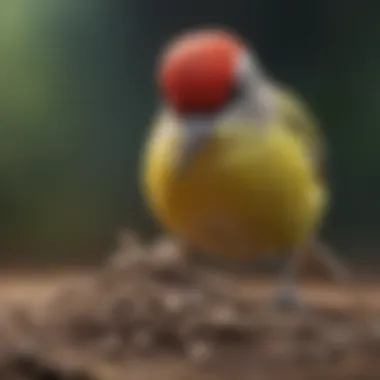
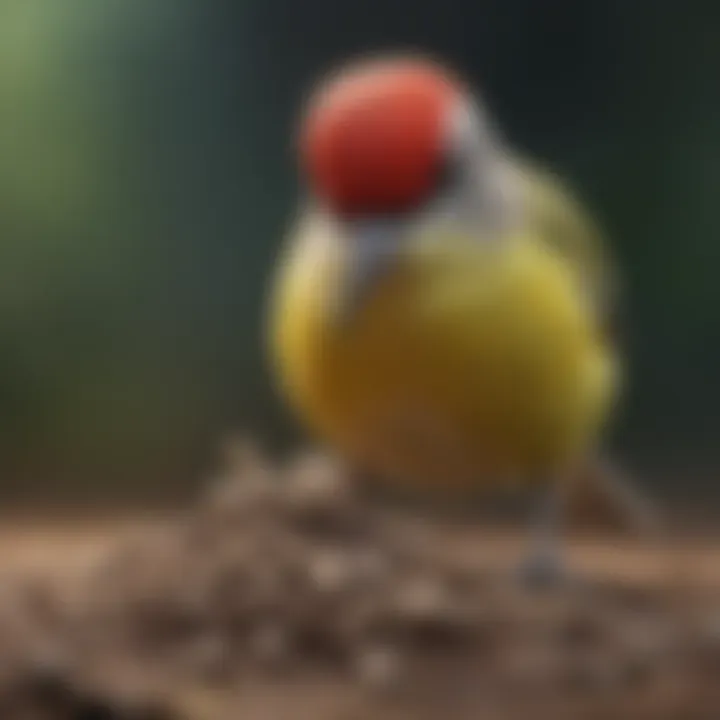
Macronutrients and Micronutrients
In the world of nutrition, both macronutrients and micronutrients play significant roles.
Macronutrients are needed in larger quantities and include:
- Proteins: Required for muscle development and cellular functions.
- Fats: Healthy fats should be included in the diet, but moderation is vital.
- Carbohydrates: They give energy and can often come from fruits and vegetables.
Micronutrients, though needed in smaller amounts, are equally important. Key vitamins for small hookbills include:
- Vitamin A: Supports vision and immune functions.
- Vitamin D: Helps with calcium absorption for bone health.
Minerals such as calcium, phosphorus, and magnesium are also crucial for various body functions. A balanced intake of both macro and micronutrients will ensure optimal health and wellbeing.
Vitamin and Mineral Supplements
To enhance or complement the diet of small hookbills, vitamin and mineral supplements can be very beneficial. While high-quality pellets often contain sufficient amounts of these nutrients, supplementation may be necessary in some cases, especially if dietary restrictions exist.
Considerations for supplements:
- Assess the specific needs of your small hookbill. Different species may have unique requirements.
- Opt for high-quality, avian-specific supplements to ensure safety.
- Introduce supplements gradually to avoid digestive upset.
"A well-balanced diet provides the foundation for a small hookbill's health and longevity."
In summary, understanding nutritional requirements is vital for small hookbills. A strategy that incorporates various essential nutrients through a combination of high-quality pellets and, where appropriate, additional supplements will help pet owners ensure the health and well-being of their birds.
Choosing the Right Tops Pellets
Selecting appropriate tops pellets for small hookbills is fundamental to maintaining their health and well-being. The right choice not only affects their physical condition but also influences their behaviors and temperament. Different pellets offer varied ingredients and nutritional profiles, which is why it is crucial to analyze these elements thoroughly.
When choosing pellets, one must consider several key factors such as ingredient quality, brand reputation, and pellet size and texture. Each of these factors plays a vital role in ensuring that the small hookbills receive the nutrients they need.
Ingredient Quality
Ingredient quality is the cornerstone of any good pelleted diet. High-quality pellets will contain natural ingredients, avoiding fillers and artificial additives. Ingredients should come from reputable sources, ensuring they are free from contaminants. Look for first ingredients to be whole grains, legumes, and a variety of seeds that relate to the bird's natural diet. The absence of high sugar levels and low nutritional content is essential.
Consideration also extends to the presence of high-quality protein sources, or even essential fatty acid content, which impacts the bird's health. Prioritizing pellets with named protein sources over generic terms is a great practice for ensuring top-quality nutrition for your small hookbill.
Brand Recommendations
Top Commercial Brands
Choosing popular commercial brands can often simplify the decision-making process due to their established reputation. Brands like Kaytee and Harrison’s Bird Foods have a long-standing history of producing quality products tailored for small hookbills. These brands emphasize using natural ingredients, with minimal processing that helps maintain nutritional integrity.
A key characteristic of these brands is their commitment to research and development. They invest in understanding bird nutrition and regularly update their formulas based on emerging findings. This trait ensures they provide a nutritionally balanced product that meets or exceeds standards. However, while commercial brands might offer convenience, they can come with a higher price tag.
Homemade Alternatives
On the other hand, homemade alternatives offer a more customizable feeding option for small hookbills. By creating homemade pellets, owners can directly control the ingredients, ensuring freshness and quality. Many bird owners prefer this option as it allows them to include various food items that the birds enjoy, making meals more appealing.
However, formulating a balanced homemade pellet is not without its challenges. It requires a solid understanding of avian nutrition and the time to prepare and store the food appropriately. If done correctly, homemade options can be both satisfying and nutritious, but there is a risk of nutritional imbalance if the recipe is not carefully crafted.
Pellet Size and Texture
The size and texture of the pellets can significantly influence a small hookbill's feeding habits. Smaller pellets are often better suited for smaller species, as they are easier for them to grasp and consume. The texture also matters; pellets that are too hard may discourage feeding, while too soft may lead to rapid spoilage.
It is also essential to rotate different pellet sizes or types occasionally, to keep the diet interesting and encourage exploratory feeding behavior. Observing the bird's preference for various sizes can provide valuable insight into their feeding habits, ensuring your choice aligns with their natural behaviors.
Feeding Practices
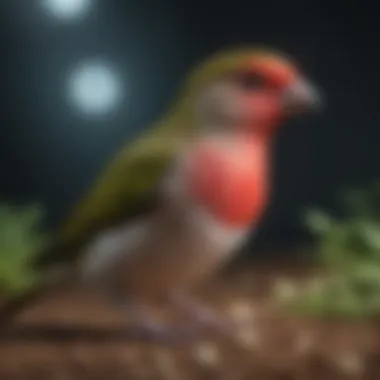
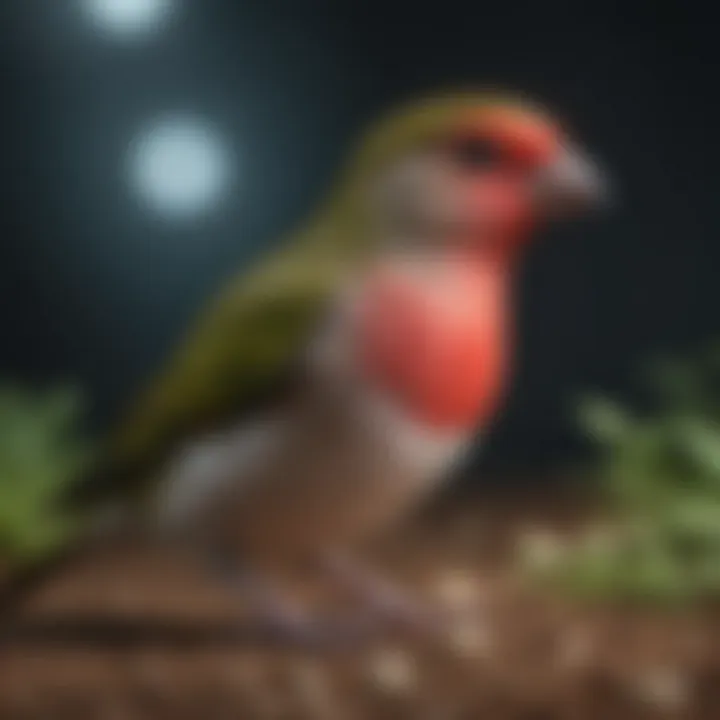
Feeding practices play a crucial role in the overall health and well-being of small hookbills. The way owners introduce pellets, establish feeding routines, and observe dietary habits can significantly influence their pets' nutrition. Understanding these aspects is vital, as it helps ensure that these birds receive adequate sustenance tailored to their needs.
Transitioning to Pellets
Transitioning small hookbills to a pellet diet requires patience and careful planning. The birds may be used to seeds, which can be less nutritionally complete. The change should be gradual to avoid digestive upset or rejection of the new food. Start by mixing a small amount of pellets with their regular seed. Gradually increase the ratio of pellets over several weeks. This method allows the birds to adapt, reducing stress and ensuring they accept their new diet.
It is important to monitor the bird's response during this period. Some hookbills may take longer to adjust, but consistent exposure can encourage acceptance. Offering the pellets in different feeding areas may also stimulate curiosity. Owners should maintain observation, as individual preferences can vary.
Daily Feeding Guidelines
Establishing a daily feeding schedule is important for small hookbills. Consistency helps create a routine, enabling owners to track their birds' eating habits accurately. Generally, a small hookbill should have access to pellets daily, with a recommended amount based on their size and species.
A common guideline is to offer pellets equivalent to about 10-15% of their body weight. Additionally, providing fresh water daily is essential for hydration. Owners should also supplement pellets with small amounts of fresh fruits or vegetables to enhance nutritional diversity.
Here are some quick daily feeding tips:
- Offer fresh pellets each day.
- Clean food and water dishes regularly.
- Monitor any leftover food to prevent spoilage.
- Adjust portions based on weight and activity levels.
Signs of Overfeeding or Underfeeding
Recognizing the signs of overfeeding or underfeeding in small hookbills is essential for maintaining their health. Overfeeding can lead to obesity, which can cause various health issues, including heart disease and joint problems. Common signs of overfeeding include lethargy, difficulty in movement, and excessive weight gain.
On the other hand, underfeeding can result in malnutrition, impacting feather quality and energy levels. Signs of underfeeding include:
- Weight loss or decreased body mass.
- Dull or ragged feathers.
- Increased vocalization or signs of distress.
Monitoring your bird's weight and appearance regularly will help you gauge their nutritional status. Adjusting portions and reviewing feeding habits may be necessary as your hookbill ages or if their activity levels change.
Remember, a balanced and proper feeding routine is key to a thriving small hookbill. Regular check-ins with a veterinarian can also provide personalized guidance on your pet's feeding practices.
Troubleshooting Common Feeding Issues
It is vital to understand the challenges that can arise during a small hookbill's feeding journey. Many pet owners may encounter issues ranging from preferences for certain types of foods to more complex digestive or behavioral problems. Addressing these issues promptly can prevent nutritional deficiencies and promote overall health. This section will explore common feeding challenges and offer insights on how to overcome them effectively.
Picky Eaters
Small hookbills can sometimes develop a selective appetite, making the transition to tops pellets difficult. They may have strong preferences for specific flavors or textures, leading them to reject less familiar foods. Owners should note that a reluctance to eat new pellets might indicate a need for gradual introduction. Offering a mix of previously enjoyed seeds or fresh fruits alongside pellets can often help ease the transition. It is also worthwhile to consider pellet shapes and sizes. For instance, smaller pellets might be more appealing for birds who prefer a bite-sized approach.
Tips for Managing Picky Eaters:
- Introduce pellets slowly, mixing them with current favorites.
- Experiment with different pellet brands to find one your bird likes.
- Monitor feeding habits closely and be patient; consistent offerings can help.
Digestive Problems
Digestive problems are another concern that can arise during the feeding process. Some small hookbills might experience issues like diarrhea or constipation due to sudden changes in their diet. A high-fiber diet is crucial for maintaining gut health. If hooksbill pets consume too many pellets too quickly, their digestive systems may not cope well. It is essential to consult a veterinarian if digestive issues persist, as they can point to dietary imbalances or underlying health problems.
Preventive Measures for Digestive Health:
- Gradually introduce any dietary changes to avoid shock.
- Ensure fresh water is always available to aid digestion.
- Maintain a balanced diet that includes fresh fruits and vegtables to support healthy hydrating.
Behavioral Concerns During Feeding
Feeding time can highlight various behavioral concerns in small hookbills. Some might exhibit anxiety or aggression, especially when competing with other birds for food. Understanding the social dynamics during feeding can help owners create a calmer environment. It’s often beneficial to feed birds in separate locations or at different times to reduce stress. Additionally, observing their body language and vocalizations can provide insights into comfort levels.
Strategies to Address Behavioral Issues:
- Establish a quiet and secure feeding area.
- Use foraging toys to encourage exploration and alleviate competition.
- Reinforce positive behavior with praise or rewards when they approach their food calmly.
Overcoming feeding challenges requires keen observation and patience. By adapting feeding practices to individual pet needs, owners can encourage healthier eating habits and improve their small hookbill's quality of life.
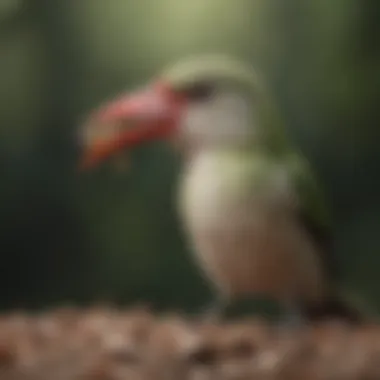
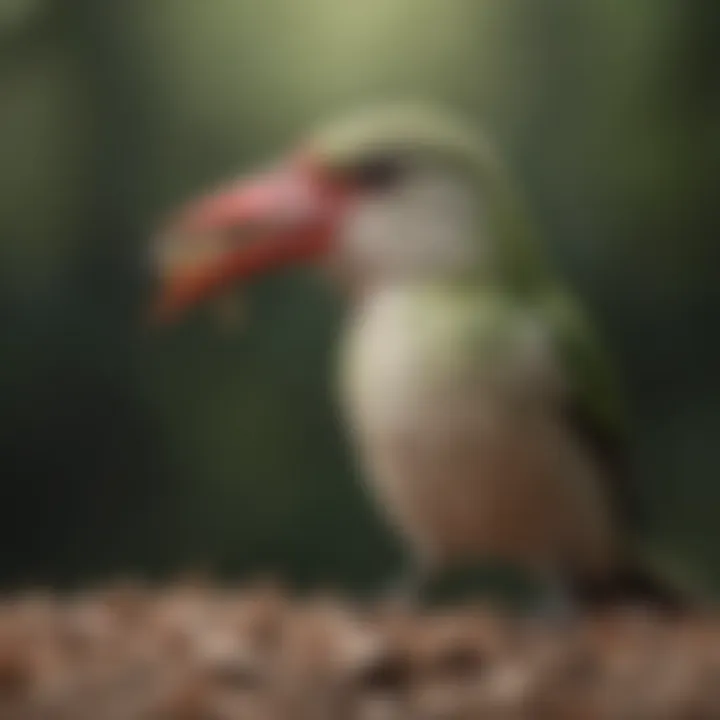
Importance of Variety in Diet
The variety in diet is a fundamental component of the overall health and well-being of small hookbills. These birds, which include species like parakeets and lovebirds, require a balanced intake that goes beyond just pellets. This ensures they receive a broad spectrum of essential nutrients, vitamins, and minerals. Relying solely on one type of food can lead to nutritional deficiencies, which can manifest in various health issues. Additionally, different foods can provide enrichment, which is vital for their mental stimulation.
Incorporating Fresh Foods
Fresh foods should be an integral part of a small hookbill's diet. Fruits and vegetables offer hydration and essential vitamins that pellets might lack. Popular options include chopped carrots, bell peppers, and leafy greens. These fresh additions can enhance the bird's diet, making it more appealing and varied. It's important to introduce new foods gradually. This helps the bird adjust to different tastes and textures without causing digestive upset.
A simple approach is to prepare a small plate of assorted fresh produce every few days, ensuring that these items are pesticide-free and safe for avian consumption.
Benefits of Fresh Foods
- Hydration: Many fruits have high water content. This can be an excellent way to keep your bird hydrated.
- Variety in Texture: Fresh foods provide different textures, which can encourage more natural foraging behaviors.
- Enhanced Vitamins: Certain vitamins are better absorbed when coming from fresh sources, promoting better health overall.
Mixing Pellets with Other Diets
Combining pellets with other food types, such as seeds and fresh produce, creates a more balanced diet for small hookbills. While high-quality pellets are designed to meet most nutritional needs, they should not be the sole food source. Mixing in seeds adds healthy fats and can be a good motivator for weight gain if needed. However, be cautious, as seeds can also lead to obesity if consumed in excess.
When introducing new food types, it is best to do so incrementally. This means gradually mixing small amounts of seeds or fresh foods into the pellets. This helps in gauging the small hookbill's reaction to the new additions and can help prevent picky eating habits.
"A varied diet is not just beneficial, but essential for the holistic health of your bird. It supports their physical and mental well-being."
Mixing Techniques
- Layering: Put pellets on the bottom of the bowl and top with fresh foods or seeds.
- Different Bowls: Use separate bowls for pellets and fresh produce, encouraging exploration.
- Scheduled Feeding: Alternate days for pellets and fresh foods, keeping meals interesting.
By ensuring a diverse diet, pet owners can provide their small hookbills with more than just nourishment. They can promote enriching experiences that foster a healthy lifestyle, decreased boredom, and improved overall health.
Long-Term Health Considerations
When it comes to the well-being of small hookbills, long-term health considerations are paramount. Caregivers must recognize that bird nutrition does not just impact immediate health but also shapes the overall life quality of these pets. By ensuring that small hookbills receive balanced and varied diets, their risk of developing chronic health issues can be significantly reduced. A well-planned nutritional strategy contributes to better longevity and enhanced vitality.
Routine Veterinary Check-Ups
Routine veterinary check-ups play a crucial role in maintaining the long-term health of small hookbills. Schedule a visit with an avian vet at least once a year, or more frequently if any health concerns arise. During these check-ups, veterinarians can conduct thorough examinations, focusing on body condition, feather quality, and behavior patterns.
Regular vet visits can help identify subtle signs of illness before they escalate into serious problems. Additionally, these appointments provide opportunities to discuss dietary practices, including any necessary adjustments to pelleted foods or the inclusion of additional supplements. Ensuring that your small hookbill is examined by a knowledgeable avian vet will offer peace of mind and serve to optimize its health.
"Prevention is key. Regular check-ups catch issues early, ensuring small hookbills stay in peak condition."
Monitoring Weight and Condition
Monitoring the weight and overall condition of small hookbills is essential for ensuring their health remains intact over the years. Pet owners should routinely assess their birds' weight, ideally weekly. It’s helpful to keep a record of the bird's weight to identify any significant fluctuations. A sudden drop in weight may indicate health problems that require prompt attention, while excessive weight can lead to obesity and its related issues.
In addition to weight, observe your bird’s overall condition. Key things to note include:
- Feather quality: Look for signs of ruffled feathers or bald patches.
- Activity levels: Is your bird active during the day or unusually lethargic?
- Behavior: Listen for vocal changes or shifts in social interactions.
By staying vigilant about their weight and physical appearance, caregivers can detect potential health issues early. This monitoring contributes directly to the long-term welfare of small hookbills, allowing for timely interventions if necessary.
Epilogue
In the realm of caring for small hookbills, nutrition stands out as a fundamental aspect influencing their health and longevity. This article has delved into various critical elements of tops pellets, offering insights that are essential for pet owners. Understanding the dietary requirements specific to small hookbills allows caregivers to make informed choices, ensuring their feathered companions receive the best possible nourishment.
Choosing high-quality pellets is paramount. Ingredients matter, as they directly affect the overall health of these birds. By focusing on superior brands, pet owners can provide a balanced diet that caters to the unique physiological needs of small hookbills. Furthermore, mixing pellets with fresh foods introduces variety, keeping the birds engaged and promoting better digestion.
Transitioning to a pellet-based diet should be handled with care to avoid upsetting the bird's sensitive digestive system. Paying attention to feeding practices can prevent issues like overfeeding or underfeeding, both of which can lead to serious health complications.
Regular veterinary check-ups play a crucial role in tracking the well-being of small hookbills. These visits help in monitoring weight and condition, providing valuable feedback to pet owners about the efficacy of their dietary choices. The culmination of these practices develops a comprehensive approach to feeding small hookbills, ensuring they thrive and live healthy lives.
Ultimately, it is the commitment to understanding these dietary elements that enables pet owners to offer their small hookbill companions a rich and fulfilling life. The journey towards optimal nutrition is ongoing, demanding attention and care to refine feeding practices continually.
Final Thoughts on Nutrition
Nutrition cannot be viewed in isolation. It is an integral part of the overall care for small hookbills. A balanced diet not only supports physical health but also contributes to behavioral stability. Ensuring that pellets are part of a diverse diet keeps small hookbills active and satisfied. Consistent observation of eating habits can lead to early detection of dietary issues, allowing for timely intervention. Remember that every bird is unique, and tailoring the diet to individual preferences will enhance their well-being. For detailed information on nutrition, consult resources like Britannica or community discussions on platforms like Reddit.
In closing, a well-thought-out approach towards nutrition and feeding practices can significantly enhance the quality of life for small hookbills, reflecting the dedication of their caregivers.







